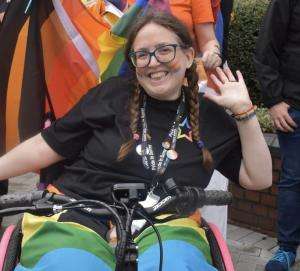'Disabled social workers are experiencing discrimination at work'

Professional Social Work magazine - 10 December, 2020
After I wrote an open letter to England's chief social workers about discrimination faced by disabled social workers there were many comments from other disabled practitioners who have faced barriers to progress at work.
My letter outlined how despite the Disability Discrimination Act (DDA) setting out rights for disabled people, there is still a long way to go.
The Equality Act 2010 which followed is only enforceable, I argued, if a disabled person has the funds and ability to bring a challenge to court. Employers, and wider society, can still be found to be avoiding their responsibilities if at all possible.
My own recent experience as a disabled social worker, and the experiences of many others, underlines the need for change.
I started out in social work in my 30s as a Family Support Worker in children’s social care, having initially qualified as a counsellor. I found a job that I loved using the skills that I have, and my employer put me forward for a one-year fast track programme, where I excelled and got a distinction.
Then two years ago I became disabled with Hypermobility Spectrum Disorder, Fibromyalgia and spinal problems.
When I first became disabled, there seemed to me to be an assumption that if you can’t do the job the same as a non-disabled person, you shouldn’t be in social work. You either put in a 70-hour week, or you don’t work at all. It seemed an incredibly negative and ableist attitude for a profession that is supposedly inclusive.
To go from being on a clear career path to being doubted over every capability was a shock. My body may not be the same but that doesn’t mean I am no longer able to practice.
After a period of time off work, when I returned I found that I had to fight for everything.
I had to fight for reasonable adjustments. I have to apply for benefits and undergo health assessments to access the equipment I need. Access to Work can help with some things, but austerity has hit local authorities hard and so it is often down to a team budget to pay for requirements, and that makes me feel bad.
There are also numerous examples of how the built environment is failing disabled people. Councils still don’t think about wheelchair access when new buildings go up, and in my daily work, access remains one of my biggest challenges.
My experiences have shown me that society is still so unequal in terms of disability. But what has really shocked me is how a profession that professes to support people of all abilities and backgrounds is, at times, failing its own.
There are reports of disabled social workers and students being refused placements, employment and progression within the profession. Disabled people are underrepresented, when in fact disabled social workers could be challenging the structural oppression faced by many service users.
We must be able to do better and demonstrate to the world what inclusion and anti-oppressive practice looks like. But to do that we need to support our staff better, because your colleague who has had experience of being in a service user’s shoes will have a very developed set of ideas on how to do social work well.
If social work as a profession is to follow the Social Model of Disability, then we need to listen more to the lived experience of service users rather than falling back on the medical model where we talk in terms of diagnoses.
Disabled social workers can be part of that ability to listen, because we bring insight to our work.
I am currently working in an adoption team and my experiences are much more positive now. There are still systems and bureaucracies that make things difficult, but the team itself is great in terms of attitudes to disability.
The pandemic has taught us many things about flexible working, and some of those lessons could be taken forward to ensure disabled people are treated equally at work.
We could have more co-working, more of a hub approach to casework, more blended working weeks and hybrid virtual meetings.
I’m asking the leaders in social work to listen to their disabled colleagues and realise that they are an important part of the profession.
It would be really good for non-disabled people to hear more about what life is like for disabled people. If we share the positives as well as the negatives, we have an opportunity to be the profession that leads the way in how society supports all minorities.
FACT BOX
Around 20 per cent of working adults have a disability
Only seven per cent of disabled people use a wheelchair
Only half of disabled people are in employment
Half of households living in poverty have at least one disabled person
